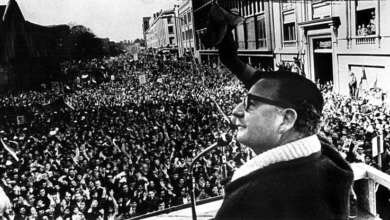Photo: President of Argentina Javier Milei. Credit: Mídia NINJA (CC BY 4.0 Deed)
On Jan. 24, 1.5 million Argentinians took to the streets in a general strike organized by the General Confederation of Labour, Argentina’s two Workers’ Central Federations (CTA de los Trabajadores and CTA Autónoma), popular organizations, human rights organizations, political parties and workers from nearly every industry. The mobilizations were a response to two pieces of legislation presented by President Javier Milei’s administration last December — the Decree of Necessity and Urgency and the Omnibus Law. If implemented, both policies would not only be disastrous for Argentina’s working class, but they could open the door to other far-right governments in the region replicating such measures and imposing their own brand of hyper-neoliberal shock therapy.
Milei: The new face of far-right populism in Latin America
Like all far-right populists, Milei — a self-identified libertarian, admirer of Milton Friedman and an economist himself — came to power on a platform of brash, inflammatory rhetoric, culture war talking points, and vague anti-government policies. His theatrics during the campaign included brandishing a chainsaw at public appearances to show his commitment to “cut down” the country’s political caste (the chainsaw is also an apt symbol for a candidate that has declared environmentalism as part of a “post-Marxist” agenda) and even caught the attention of the Republican Party. Rhetoric notwithstanding, since taking office on Dec. 10, 2023, Milei has followed the far-right neoliberal handbook to a tee.
Abroad, Milei has cozied up to the imperial powers, isolated Argentina from all progressive governments, and courted the favor of international finance. During his short stint in office, Milei has: severed diplomatic relations with Venezuela and Cuba, resumed talks with the International Monetary Fund, declined to join the BRICS, and publicly attacked China. More recently Milei visited Israel during the apartheid state’s ongoing genocide of the Palestinian people and announced plans to move Argentina’s embassy to Jerusalem. At home, Milei has all but declared war on the working class, with sweeping legislation that not only seeks to wither the power of the legislative branch but also dismantles workers’ rights, deregulates nearly every industry, imposes austerity measures, and opens up the country to private plunder.
Class war codified into law
The two pieces of legislation that brought millions of Argentinians to the streets are the Decree of Necessity and Urgency and the Omnibus Law (laughably titled “Guidelines and Starting Points for the Freedom of Argentinians”). Together, these two pieces of legislation are a veritable wishlist of neoliberal policy and are prime examples of ruling class lawfare.
Announced just 10 days after Milei took office, the DNU is a legislative measure that the executive can use to circumvent Congress and push through legislation quickly and without oversight. The nearly 400 articles included in the decree would overturn or modify dozens of pieces of legislation, with the aim of deregulating major sectors of the economy from energy and finance to healthcare and communications.
The DNU also promotes privatization of state companies including the national bank and makes “foreign investment” (in other words, foreign plunder) in the country easier. Most notably, it also attacks basic worker’s rights like the right to strike. The Omnibus Law in essence expands the reach of Milei’s deregulatory policies to include everything from changes to the penal code and pension plans to education and gender policies. Some of the proposed policy changes include: stiffer sentences for protesters, privatization of the national energy company, major cuts to both the culture and education sectors, rolling back of several environmental protection laws, and sweeping reforms to the electoral system.
But the severity of these attacks has only been matched by the wide resistance of the Argentinian people and their steadfast commitment to preserve their rights.
A victory for the people
After the general strike and days of massive mobilizations, last week the Argentinian courts voted to suspend Milei’s Omnibus bill. In a major defeat that came while the president was in Israel showing his support for a genocidal regime, the people demonstrated their power by putting pressure on their government to reject the unpopular bill. It’s a huge victory not only for the Argentinian working class but for all working people around the world.
Though the bill is only “suspended” and can thus be brought to appeal for later approval, the fact that the courts ruled in favor of the workers is a testament to popular power and what a well organized working class can achieve when it mobilizes against ruling class aggression.






